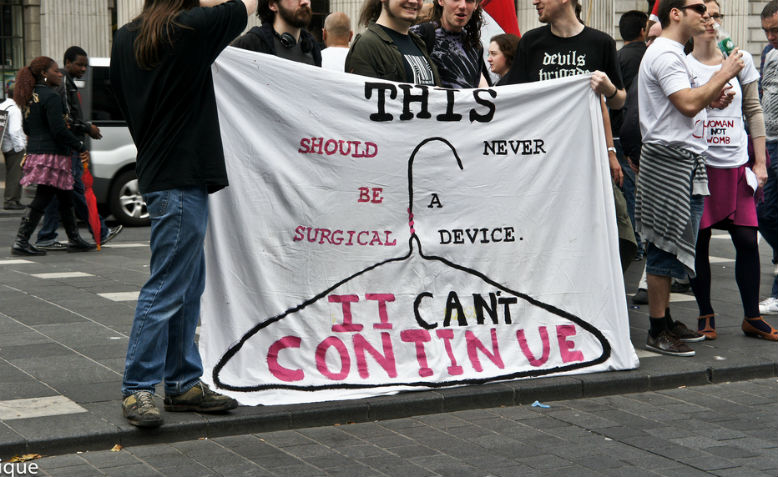 Pro-choice demonstrators on the street in 2011, Dublin. Photo: Flickr/William Murphy
Pro-choice demonstrators on the street in 2011, Dublin. Photo: Flickr/William Murphy
A new generation of female activists is refuelling Ireland’s reproductive struggles, observes Kara Bryan
According to Irish police up to 12,000 people took to the streets of Dublin to join a day of action on International Women’s Day in solidarity with the first international women’s strike, ‘A Day Without A Woman’ to protest Ireland’s draconian anti-abortion law and the overbearing influence of the Catholic church on Irish politics.
Women on more than 50 strike actions across the globe were encouraged to wear red to raise awareness and highlight women’s role in society. But in Dublin protestors wore black in solidarity with Polish women who recently demonstrated against proposed legislation in Poland criminalising abortion, chanting ‘Not the church, not the state, women must decide their fate!’
The demonstration was organised by Coalition to Repeal the Eighth Amendment comprising of over 80 different groups calling for a national referendum to repeal the Amendment. Similar demonstrations were held in Cork, Wexford, Mayo, Kilkenny, Meath, Waterford and Limerick among other locations.
Abortion has been illegal in Ireland since 1861 under the Offences Against the Person Act. The Eighth Amendment, which was introduced to the Irish Constitution in 1983 to prevent abortions being legalised in future, guarantees the right to life of an unborn foetus and replaces previous anti-abortion legislation. The merciless law is even applicable to pregnancies resulting from rape and incest and extends to minors and cases of foetal abnormality.
In 1992, a further amendment was introduced allowing women to travel outside the country to seek abortion. Since then over 150,000 have sought abortions outside Ireland. According to UK Department of Health statistics, at least ten women travel to the UK from Ireland seeking abortions every single day.
Last year, a landmark UN judgement castigated the Irish government and found that the Eighth Amendment was in direct contravention to the UN International Covenant on Civil and Political Rights and recommended Ireland ‘amend its law on voluntary termination of pregnancy, including if necessary its constitution.’
For too long the Catholic Church has exerted undue influence on the state, threatening those who might seek to challenge the status quo with excommunication. And whilst Ireland is unlikely to throw off the church’s parochial chains anytime soon, public opinion is changing in line with contemporary thinking.
Abuse
In 2011, a census found that the number of Irish Catholics attending church on a weekly basis had dropped from 90% in 1984, to 18% in 2011. Mass attendance dropped in the 1990s when the country began extensively modernising during the ‘Celtic Tiger’ economic boom, adopting more liberal socio-economic attitudes and the church lost its standing as nexus of the community.
At the same time, the Roman Catholic church was beleaguered by innumerable sex abuse scandals which were particularly prevalent in Ireland due to the pervasive, unparalleled power of church over state.
The recent grim discovery of up to 800 babies unceremoniously dumped in a septic tank belonging to a former mother and baby home in Tuam, Co. Galway will perpetuate this trend. Tests commissioned by a state-appointed inquiry confirmed the remains were human and ranged from premature babies up to three years old.
The Bon Secours home was one of ten such homes run by religious orders where an estimated 35,000 unmarried pregnant women were sent between the 1920s and the 1960s to conceal their ‘shame.’ Children were subject to rampant physical and emotional abuse. The Bon Secours order of nuns, who make lucrative profits from two private hospitals, has yet to apologise or offer any financial compensation.
Amid recent developments, it is now feared that that Tuam is just the tip of the iceberg and that there could be up 7,000 more children’s remains hidden in mass graves at other locations across the country. At Bessborough, where it was alleged that sirens would alert nuns when mothers were trying to escape, the child mortality rate was 70%, higher than in some concentration camps.
Autonomy
The unholy alliance of church and state in Catholic Ireland condemned unmarried pregnant women and their babies to hell on Earth, systemically covering up the abuse and are to this day still trying to control women’s bodies.
The Irish government owes a terrible debt to the victims. They are obliged to make amends. Not with token apologies and expensive memorials but by insulating politics from the draconian dogma of the church and by recognising women’s rights to autonomy over their own bodies.
Governments must accommodate changing public opinion in accordance with democratic principles and the Irish government must honour the memory of the victims of the mother and baby homes by empowering the women of Ireland.
Remarkably, nobody of a present reproductive age has had an opportunity to vote on abortion law. Its time for that to change. Its time for Ireland to enter the 21st century and repeal the draconian Eighth Amendment and confine the parochial influence of the church on the state to history where it belongs.

